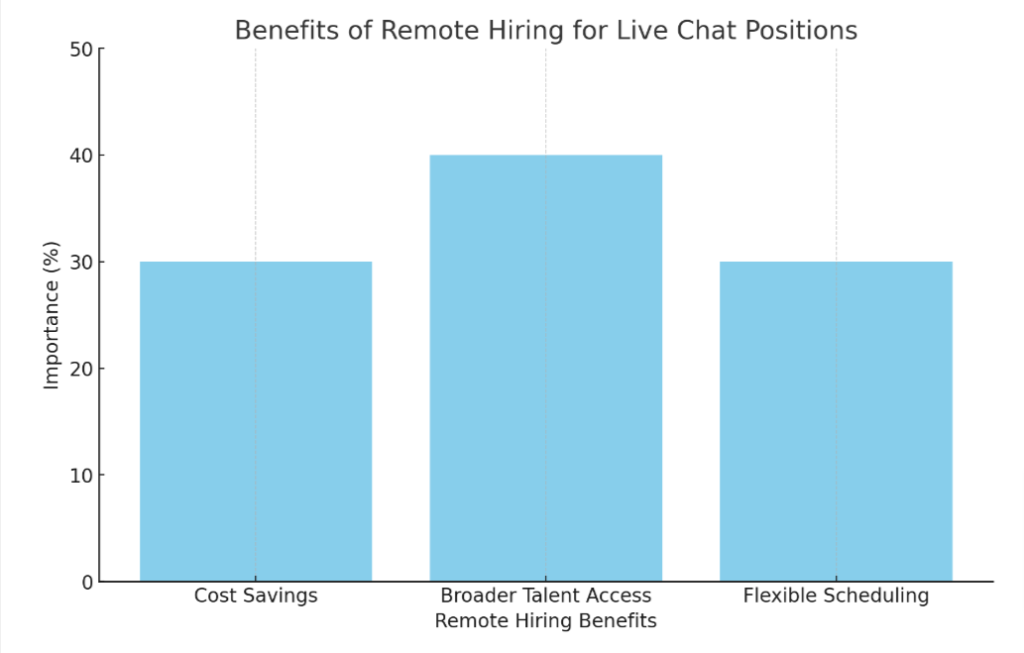Succeeding in Remote Interviews: A Guide for Aspiring Live Chat Professionals
Landing the perfect live chat specialist can feel like searching for a needle in a digital haystack. A staggering 70% of job seekers are now open to remote opportunities, reshaping how companies recruit.
This guide will show you the ropes of interviewing candidates remotely, ensuring your live chat team is top-notch without ever meeting face-to-face. Let’s dive in and find that needle!
Key Takeaways
- Remote interviews require a quiet location, professional background, and good lighting for a clear camera image. Test equipment like microphones and video software before beginning to avoid technical problems.
- Effective virtual interviewing includes incorporating personable small talk that eases into deeper topics, demonstrating active listening skills by tuning in to subtle cues, and staying engaged with positive body language and eye contact.
- Lower costs from reduced travel and accommodations expenses are one of the main benefits of remote hiring. Access to a broader talent pool without geographic barriers allows companies to find top candidates more quickly.
- Organizing your application process is key in remote hiring; use applicant tracking systems, set timelines, standardize interview questions, store documents digitally, communicate regularly with your team, evaluate applicants objectively using rubrics.
- Set up an effective remote interview by confirming technology works properly on both ends, preparing materials ahead of time. Ask strategic open-ended questions tailored to live chat roles and clearly communicate next steps post-interview.
Differences Between In-Person and Remote Hiring & Interviewing
Remote hiring and interviewing require a different set of skills compared to in-person interactions. This includes adapting to virtual setups, staying engaged, and mastering remote communication techniques.
Location, setup, and presentation
Choosing the right location for your virtual interviews can make a significant difference. Pick a quiet spot free from distractions where you can focus solely on the candidate and their responses without interruption.
Ensure that your backdrop is professional and neutral; avoid clutter or anything that might detract from the interaction. Good lighting is crucial, too—it helps create a clear image on camera and shows that you’re well-prepared.
Setting up your equipment ahead of time ensures the interview runs smoothly. Test your microphone, speakers, and video conferencing software before starting. This way, technical issues won’t disrupt the flow of conversation.
Dress as if it’s an in-person meeting because presentation matters even online. Your attire sends a message about your company culture and professionalism to potential live chat team members during virtual job interviews for customer service positions.
Small talk
Small talk plays a different role in virtual interviews for customer service positions. It sets the tone and helps build rapport between the interviewer and candidate, even through a screen.
Unlike an in-person meeting where you might comment on the weather or office decor, online small talk often starts with tech check-ins. You might ask if their video conferencing software is working well or if they need a moment to adjust their setup.
This eases candidates into the conversation and shows your interest in their comfort.
For remote job interviews, throw in some light-hearted questions that can reveal personality traits and communication skills vital for telecommuting roles. Ask about their home office or favorite morning beverage to kick-start a friendly dialogue.
Keep it brief but genuine; this ensures candidates stay relaxed which allows for more authentic responses as you transition smoothly into deeper interview topics like remote work experience or virtual job training capabilities.
Listening skills
Moving from small talk to the core of the interview, mastering listening skills becomes essential for both parties. Interviewers should tune in to candidates’ responses, catching subtle cues and understanding their fit for telecommuting positions.
Candidates must also listen actively, demonstrating their capability to engage with clients in a live chat environment effectively. Good listeners will pick up on key details mentioned by the interviewer about virtual job screening and online interviewing techniques which could be critical for success in remote communication roles.
To ensure a smooth virtual interviews process, clear audio is crucial – use high-quality headphones or speakers during video conferencing interviews. This minimizes misunderstandings and shows your commitment to effective digital communication—a must-have skill for anyone interested in remote workforce hiring.
Avoid multi-tasking during this time; give your full attention as if you were face-to-face, showing respect and increasing your chances of making a good impression within the remote hiring landscape.
Staying engaged
Maintain focus during the remote interview by actively listening to the interviewer. Show enthusiasm and interest in the conversation, using positive body language and eye contact.
Respond promptly to questions, providing thoughtful answers that demonstrate your understanding of the role and your qualifications for it. Utilize virtual communication tools effectively during live chat interviews, such as mirroring the tone of voice and energy of the interviewer to foster a sense of connection despite not being in person.
To stay engaged during a remote interview for a live chat position, ask insightful questions about the company or role. Demonstrating genuine curiosity can show your dedication to preparing for this opportunity.
Benefits of Remote Hiring & Interviewing
Remote hiring and interviewing offer lower costs, access to talented people, and fast hiring processes – click on the link to learn more about how remote interviews can benefit your live chat positions.
Lower costs
Reducing expenses on in-person interviews can be a significant advantage of remote hiring. Eliminating the need for travel, accommodations, and possibly even catering means saving money at every stage of the interview process.
Utilizing video conferencing tools also reduces overhead costs associated with hosting interviews in physical locations, making it an efficient and cost-effective option for employers.
Access to talented candidates worldwide without the added expense of relocation or commute packages is another way that remote hiring lowers costs. This opens up opportunities to source from a more diverse pool of applicants without incurring extra expenses traditionally tied to bringing on new employees.
Access to talented people
Remote hiring opens up the talent pool to a broader range of skilled individuals. Without geographical constraints, companies can source and employ top-tier professionals from any location.
This allows for diverse perspectives and expertise, contributing to a stronger and more innovative workforce that can help drive business growth.
Furthermore, remote hiring eliminates the need for relocation or commuting, making it easier for qualified candidates who might not otherwise consider an opportunity due to geographical limitations.
Fast hiring
Streamlining the remote hiring process leads to fast hiring, giving your company a competitive edge in securing top talent. Leveraging virtual job interviews and online job screening tools can accelerate the recruitment timeline significantly.
By promoting telecommuting job opportunities, you attract a wider pool of candidates, while digital interviewing best practices help speed up the selection process. Emphasizing remote communication skills and virtual interview preparation enables efficient evaluation of potential hires for live chat roles.
Lower costs Access to talented people Efficiently evaluate Virtual interview preparation Remote hiring process Digital interviewing best practices Telecommuting positions Online chat support interviews Fast hiring Streamlining Telecommuting job opportunities Remote workforce hiring Video conferencing interviews Live chat recruitment Virtual interviewing Online interviewing techniques
Remote Hiring Process
Creating a job post for a remote position is the first step in finding the right talent. Promoting your remote position and staying organized during the application process are also crucial for ensuring a successful hiring process.
Creating a job post for a remote position
To create a job post for a remote position, begin by clearly outlining the job role, responsibilities, and required skills. Highlight the benefits of working remotely and specify the technical requirements, such as stable internet connection and specific software knowledge.
Emphasize clear communication skills and ability to work independently. Use keywords related to remote work in your job description to attract relevant candidates. Consider including information about your company culture and values to give potential applicants a sense of what it’s like to work for your organization.
Be sure to specify the application process clearly – include details on how candidates should submit their applications, what materials they need to provide (e.g., resume, cover letter), and any pre-employment assessments or tests they might need to complete.
Promoting your remote position
To attract top talent, showcase your remote position by highlighting the flexibility and autonomy it offers. Use keywords such as “telecommuting,” “virtual job,” and “remote workforce hiring” in your job post to reach qualified candidates searching for remote opportunities.
Emphasize the benefits of working remotely, like work-life balance and lower commuting costs, to appeal to a wider pool of applicants. Additionally, promote your remote position on social media platforms and industry-specific job boards to maximize exposure.
Once you have effectively promoted your remote position, it’s time to focus on staying organized during the application process.
Staying organized during the application process
Staying organized during the application process is essential for remote hiring for live chat positions. Here are ways to stay organized:
- Utilize an applicant tracking system to manage applications and candidate communication efficiently.
- Set clear timelines and deadlines for each stage of the application process, ensuring that applicants are informed about the next steps.
- Develop standardized interview questionnaires or assessments to streamline candidate evaluations.
- Use digital folders or cloud storage to keep all relevant documents and information easily accessible.
- Regularly communicate with the hiring team to ensure everyone is updated on candidate progress and feedback.
- Implement a structured evaluation rubric to compare candidates objectively based on predetermined criteria.
- Keep detailed records of all communication with candidates, including emails, notes from interviews, and any follow-up correspondence.
Remote Interview Process
Setting up the interview involves scheduling a convenient time, ensuring both parties have the necessary technology and testing it beforehand. Asking the right questions during the interview is crucial to assess communication skills, problem-solving abilities, and technical knowledge.
Establishing the next steps after the interview is essential for providing candidates with clarity and keeping them engaged in the hiring process.
Setting up the interview
When scheduling the remote job interview, make sure to agree on a specific date and time that works for both parties. Send clear instructions about the video conferencing tool you’ll be using and provide support in case the candidate encounters technical issues.
Ensure that the lighting and background in your video feed are professional and distraction-free. Set up a quiet, private space with a stable internet connection for the duration of the interview.
Prepare any necessary materials or documents you may need during the virtual meeting.
Asking the right questions
During remote interviews for live chat positions, asking the right questions is crucial to gauge a candidate’s communication skills and problem-solving abilities. Use open-ended questions to encourage candidates to elaborate on their experiences and provide specific examples of how they’ve handled challenging customer scenarios.
Incorporate situational questions related to handling multiple chat conversations simultaneously or de-escalating an upset customer in a live chat scenario. Focus on probing for details about the candidate’s adaptability, empathy, and ability to work independently in a virtual environment.
As you prepare your interview questions, consider tailoring them specifically to the unique demands of remote customer service roles. Emphasize inquiries about technical proficiency with chat software, time management skills working remotely, and strategies for maintaining positive customer interactions through written communication channels.
By strategically framing your questions around the nuances of remote live chat support roles, you can effectively assess a candidate’s readiness for this specialized position without needing physical proximity or face-to-face interaction.
Establishing the next steps
After the remote interview, communicate the next steps clearly to candidates. Provide a timeframe for when they can expect to hear back from you. If there are additional rounds of interviews or tasks, inform them about it and set expectations.
Make sure they understand what will happen after the interview, whether they get the job offer or not.
Incorporate these practices into your remote hiring process to ensure a smooth and transparent experience for both you and your potential hires. This clarity will demonstrate professionalism and respect their time, making it more likely that you’ll attract top talent for your live chat positions.

Conclusion
In summary, live chat positions present unique challenges for remote interviewing. Maintaining engagement and assessing communication skills are crucial for evaluating candidates effectively.
Employers can leverage the benefits of remote hiring while adapting their processes to ensure successful virtual interviews. Flexibility and adaptability will be key in the future of hiring for live chat positions in a remote work environment.

